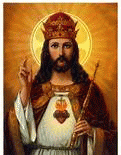
Christ King of the Universe
(Image by 4.bp.blogspot.com/-8RmPlMBmkQA/UK7mO_buByI/AAAAAAAABMo/lp5_uZOo8jY/s1600/christ-the-king.jpg) Details DMCA
Readings for the feast of "Our Lord Jesus Christ, King of the Universe": 2 SM 5: 1-3, PS 122: 1-5; COL 1: 12-20; LK 23: 35-43.
Today the Catholic Church celebrates the feast of "Our Lord Jesus Christ, King of the Universe." The contrast between the feast's grandiose title and the readings prescribed for the occasion illustrate a basic reason behind the irrelevance of the church (and Jesus) to the post-modern world. It's irrelevant to the social and economic transformations necessary to redeem the church's overwhelmingly Third World membership from globalized oppression.
The contrast I'm referring to involves the great makeover of Jesus of Nazareth changing him from the leader of an anti-imperial revolutionary movement into a pillar of the exploitative status quo.
Let me put it this way: through 4th century sleight of hand, the Jesus who sided with the poor and those oppressed by empire -- the one who promised a new heaven and earth belonging to the simple and poor, and who was executed as a terrorist by Rome -- was made to switch sides. He was co-opted and domesticated -- kicked upstairs into the royal class. He became not only a patron of the Roman Empire, but a "king" complete with crown, purple robes, scepter and fawning courtiers.
Following that transformation, kings and popes (now themselves transformed into gaudy temporal rulers) claimed to govern by divine right on behalf of Jesus as his representatives and vicars. In this way, the poor and oppressed (who then and now constitute the world's majority) lost their paradigmatic leader, example and advocate. Jesus became instead a key part of the apparatus oppressing them.
Reza Aslan's recent best-seller, Zealot, attempts to rescue the revolutionary historical Jesus from the distortions of the royal classes just mentioned. Aslan connects his salvage project specifically with today's account of Jesus' crucifixion in Luke, Chapter 23. In doing so, the author pays particular attention to Jesus' cross, to the Roman inscription identifying Jesus as "King of the Jews," and to the dialog between Jesus and the two "thieves" presented as sharing his fate.
According to Aslan, all three -- cross, inscription and dialog -- mark Jesus as a dangerous revolutionary "terrorist" rather than a domesticated upholder of the given order. That terrorist remains as threatening to today's dominant empire, the U.S.A., as he was to imperial Rome. So he continues to be erased from history and by "feasts" like today that mask his true identity.
Take the cross first. It was the mode of execution reserved primarily for insurrectionists against the Roman occupation of Palestine. The fact that Jesus was crucified indicates that the Romans believed him to be a revolutionary terrorist. How could it have been otherwise, Aslan asks? After all, Jesus was widely considered the "messiah" -- i.e. as the one, like David in today's first reading, expected to lead "The War" against Israel's oppressors.
Moreover, he proclaimed the "Kingdom of God," a highly politicized metaphor which could only be understood as an alternative to Roman rule. It would return Israel, Jesus himself promised, to Yahweh's governance and accord primacy to the poor and marginalized. The Romans drew logical conclusions. Put otherwise, the Roman cross itself provides bloody testimony to the radical threat the empire saw personified in Jesus.
That threat was made specific in the inscription the Romans placed over the head of the crucified Jesus. It read, "King of the Jews."
Typically, those words are interpreted as a cruel joke by the Roman procurator, Pontius Pilate -- as if he were simply poking fun at those who saw Jesus as the worthy successor of Israel's beloved King David.
However, according to Reza Aslan, nothing humorous was intended by the inscription. Instead it was a titulus. Every victim of crucifixion had one -- a statement of the reason for his execution. The motive for Jesus' crucifixion was the same as for the many others among his contemporaries who were executed for the same crime: aspiring to replace Roman rule with home rule -- with an Israel governed by Jews instead of Romans. The titulus on Jesus' cross, along with the cross itself identify him as the antithesis of what he eventually became, a Roman tool.
And then there are those two thieves. Aslan says they weren't "thieves" at all. That's a mistranslation, he points out. A better translation of the Greek word, lestai , would be "bandits" -- the common designation in the first century for insurrectionists. And there probably weren't just two others crucified the day Jesus was assassinated. There may have been a dozen or more.
And, no, the whole world wasn't watching either. As scripture scholar John Dominic Crossan observes, Jesus would have represented hardly a blip on the screen of Pontius Pilate. And Jews would have averted their eyes from the spectacle depicted in this morning's gospel. They wouldn't want to see "one more good Jew" suffering the fate of so many heroic patriots.
In this context the dialog between Jesus and two of the terrorists crucified with him takes on great significance. Actually, it documents the beginning of the process I described of changing Jesus' image from insurrectionist to depoliticized teacher.
Think about it. Luke's account of Jesus' words and deeds was first penned about the year 85 or 90 -- 20 years or so after the Roman-Jewish War (66-70 C.E.). By then the Romans had utterly defeated the Jews, destroyed Jerusalem and its temple as well as slaughtered the city's population including practically all of the eyewitnesses of Jesus' messianic campaign. Virtually the only Christians left standing were foreigners -- gentiles living in population centers like Rome, Alexandria and Antioch. Few of these had any understanding of or sympathy for Judaism much less for Jewish politics and its liberation movements.
(Note: You can view every article as one long page if you sign up as an Advocate Member, or higher).





